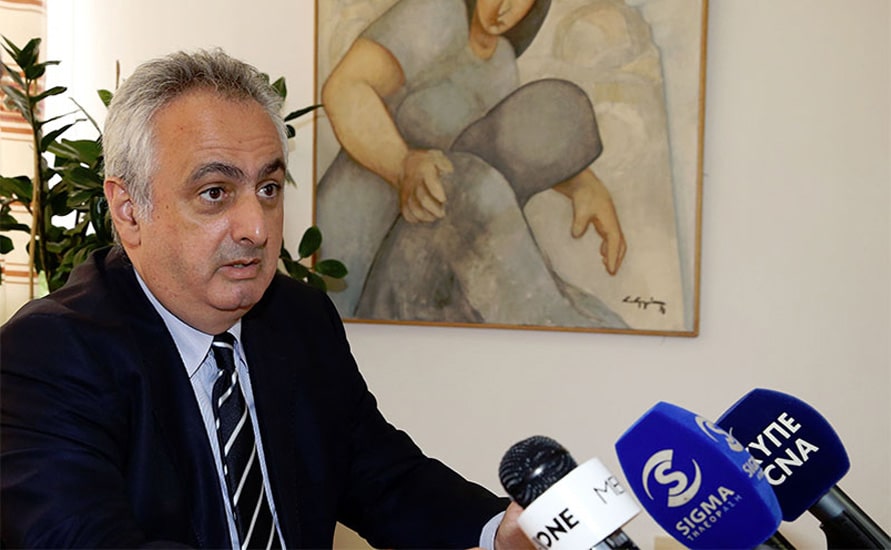The truth about the past should be uncovered and made known to people to avoid repetition
The human rights lawyer and former candidate for president of the Republic of Cyprus (RoC) Achilleas Demetriades was in London last week where he promoted his idea of upgrading the Committee on Missing Persons (CMP) into a truth commission during a meeting at Portcullis House in the UK parliament.
His proposal is to convert the bicommunal CMP into a truth commission to enable it to make findings about the circumstances and cause of death of missing persons. Under its current terms of reference, the function of the CMP is limited to investigating the whereabouts of missing persons, their disinterment and the preparation of comprehensive lists of the missing of both communities. Demetriades’ proposal is to amend the terms of reference to enable it to investigate and receive evidence about the circumstances in which missing persons (1,510 Greek Cypriots and 492 Turkish Cypriots) disappeared. A truth commission would not ascribe responsibility and it would be necessary to grant statutory immunity from prosecution to any person providing information on whether and how missing persons were killed.
At present there is an undertaking given by the attorney-general in 1981 and his Turkish Cypriot counterpart that it would not be in the public interest to prosecute any witness who, in giving evidence to the CMP, discloses self-incriminating information.
Not every criminal offence needs to be prosecuted if it is not in the public interest. On the other hand, the more serious the crime the less likely that it would be in the public interest not to prosecute. Sometimes, however, the public interest requires immunity to be exchanged for information.
The difficulty in the context of the function of any truth commission is that it is normally concerned with acts that amount to gross violations of human rights associated with the political objectives of warring parties. As such the undertaking given by the law officers of the two communities in 1981 for the purpose of the limited functions of CMP would not suffice to cater to the wider remit of the truth commission that is known to require stronger statutory guarantees.
It is a big ask to expect persons – many in their twilight years – to come forward and provide information that may incriminate them without cast iron guarantees they will not be prosecuted. The proposal therefore envisages a law to render inadmissible in criminal, civil, administrative or any other legal proceedings evidence given orally or in writing to the truth commission.
Transitional justice processes such as truth commissions are known to be effective to overcome conflict and deadlock and sometimes a necessary part of the procedural aspect of the right to life under the ECHR. They help the healing process after conflicts by affording an opportunity to victims to vent their grief and the making of amends for the wrongs done to them, and at the same time inform the public reliably of the violations that occurred with recommendations for the prevention of future violations.
The best known truth commission was the one in South Africa appointed by Nelson Mandela in 1995 and chaired by the late Archbishop Desmond Tutu, who Demetriades said was his source of inspiration for a truth commission for Cyprus.
The South African Truth Commission was set up by legislation to investigate human rights violations without rancour and without ascribing blame. It gathered information and took evidence from anyone with knowledge about the victims and their fate and the circumstances in which they were killed.
The legislation enabled immunity from prosecution to be granted in respect of acts associated with political objectives in the course of the conflict in South Africa during the apartheid years of 1948-1990.
The rationale behind setting up the Truth Commission in South Africa is contained in the preamble to the legislation that set it up. It says that the bridge between a past of conflict and human rights violations and a civilised future that respects human rights requires the truth about the past to be uncovered and made known to the nation so as to avoid repetition.
The idea must have been inspired by Mandela’s personal journey from prison to the presidency of South Africa after spending 27 years in prison for conspiring to overthrow the apartheid state. His credo was that to forgive is not just altruistic but also motivated by self-interest. At the heart of the South African Truth Commission process was the African political philosophy known as ubuntu (collective compassion and humanity). As the preamble to South Africa’s Truth Commission law says, there is a need for understanding not vengeance, a need for reparation not retaliation, a need for ubuntu not victimisation.
The nature of the conflict in South Africa during the time of apartheid was different to the inter communal strife in Cyprus, but the need for truth is as crucial to reconciliation as it was in South Africa.
It so happens that the UN secretary-general’s personal envoy to Cyprus Maria Holguin, who is charged with finding common ground in Cyprus, was foreign minister of Colombia when the Colombian Truth Commission that reported in 2022 was set up. And there are good reasons to believe that if she suggests setting one up for Cyprus she may find the two sides are not averse to taking the mild but crucial step forward to convert the CMP into a truth commission – common ground at last!
In welcoming the Colombian Truth Commission’s final report, UN high commissioner for human rights Michelle Bachelet said “without truth there can be no reconciliation, without reconciliation the risk of repetition remains real.” As Demetriades said at the conclusion of his presentation – misquoting John Lennon – give truth a chance!
Alper Ali Riza is a king’s counsel in the UK and a retired part time judge







Click here to change your cookie preferences